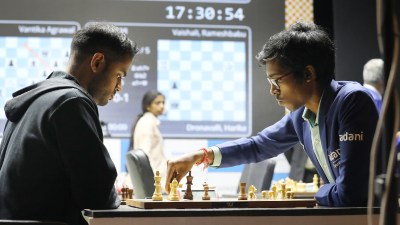Grace under fire
Icy winds made my face numb as I walked cautiously on a frozen track. I was with a group of journalists who were being taken around to under...

Icy winds made my face numb as I walked cautiously on a frozen track. I was with a group of journalists who were being taken around to understand what it is like to guard the nation8217;s borders. Tough, indeed, we all agreed. Even walking was a major effort. But our guide 8212; an officer of the rank of major 8212; was oblivious of our plight.
In fact this very terrain had witnessed a fierce gun battle a few days earlier and about 40 young boys 8212; mostly Kashmiris and Pakistanis 8212; were killed. It was incredible, considering that it happened at a time when the common people believed that the 8216;mujahideen8217; were invincible. Nobody, I remember, had initially trusted the army8217;s version of that encounter.
We found one habit of our host very irritating. At frequent intervals he would sing paeans to his boss and we would find ourselves looking at each other. Isn8217;t sycophancy part of the job in hierarchical organisations like the army, anyway? Our host then whispered into my ears, 8220;Ma8217;am, today he8217;s the youngest brigadier in the army and I can bet one day he will be the chief.8221; His prediction came true. Nearly 15 years later, J.J. Singh became the chief of the Indian army.
The incident that had just occurred took place in a remote village in the foothills of the Himalayas in Uri, north Kashmir, called Lacchipora. Carried out over three days, it was led by J.J. Singh 8212; a brigadier then. Army jawans had spread all over the hills; spent nights in the cold under the pines. They had looked for footprints; traces of a fire; leftovers of a meal; even human excreta of the infiltrators from Pakistan. Patiently each jawan waited for the intruder to come to a no-escape point to initiate the fight.
It was the timing and precision of the operation that made it so memorable. Also it helped greatly to counter militant propaganda. Presumably the story must have helped many young boys realise that they can easily lose lives if they chose to cross to Pakistan for arms and sabotage training.
Singh, one of the youngest brigadiers in the Indian army then, was injured in his leg during the operation. He was shifted out, probably to Chandigarh. But as soon as he was well, he flew back at Lacchipora. Walking with the help of a stick, he made his presence felt there. You had to meet his juniors to see what it meant for their morale. 8220;He walked like a tiger,8221; an awe-struck officer told me. Also his walking in Lacchipora was a rebuff to the militants who had spread the rumour that J.J. Singh had been killed.
But it was their graceful act of giving a decent burial to the dead 8212; even those of their enemies 8212; that moved people. Bodies of all the militants were buried with proper religious rituals. A local maulvi, whom I met later, had been hired for the job. It is men like J.J. Singh who gave the Indian army a reputation for being humane 8212; even in times of dangerous insurgencies.
- 01
- 02
- 03
- 04
- 05































